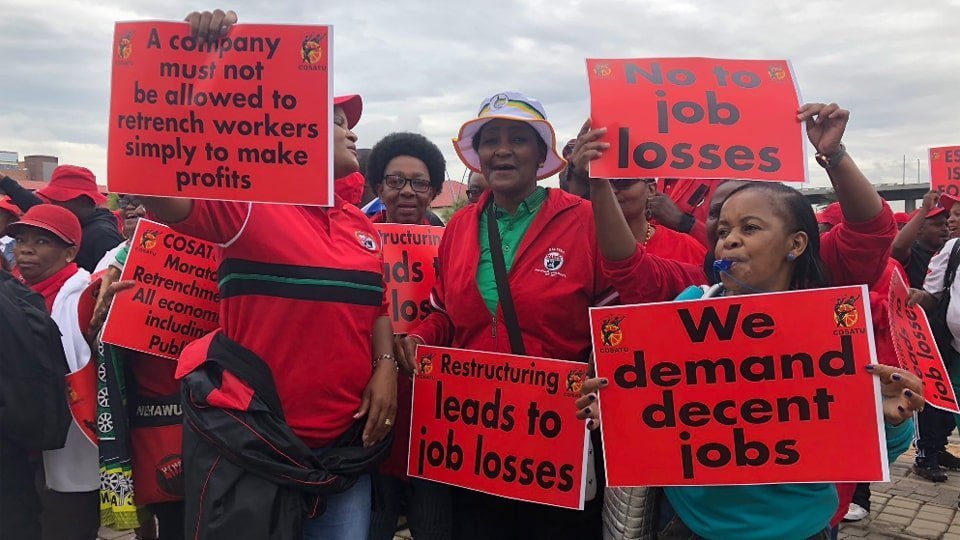The wrong things your employer is doing against you

The wrong things your employer is doing against you: Slavery and inhuman HR practices in Ghanaian workplaces are realities that many do not even notice. You are already experiencing them without knowing, it is time to open your eyes and question how you are treated as a worker in the company you find yourself in.
Ghanaian workplaces can be very hostile to employees who work in such places in diverse ways that become not only modern slavery but serious inhuman practice that are detrimental to the employee and his or her growth. In many instances the Labour Act, 2003 – Act 651 does not seem to be working in many workplaces as the spirit and letter of the law is subdued by employers to the detriment of their workers who themselves lack knowledge about not only their rights but where to seek help also as a result of the fact that, state institutions who are to deal with employer-employee conflicts, labour abuse and others are not visible. The labour commission aims at (3) Policy Objectives as part of the STRATEGIC OVERVIEW OF THE NATIONAL LABOUR COMMISSION. They are to
Promote harmonious labour relations environment
Compliance with the laws regulating the employment relationship
Adherence to procedures for addressing industrial disputes/disagreements
However, these are not been felt in workplaces…
Dehumanizing work practices in workplaces continue and never get noticed, today they include but not limited to overwork, being undervalued in the workplace, being underpaid, being denied social security and emotional labour, which contributes to workplace stress. To dehumanize a worker implies depriving the worker of human qualities, personality, or dignity putting the person through degrading conditions or treatment which may become a normal evil that is never noticed or even when noticed, ignored and unquestioned.
Slavery and inhuman HR practices in Ghanaian workplaces are real, and the need for both public and private HR institutions to empower employees in public and private employment with the requisite skills is long overdue.
What are some of the HR issues which need to be given attention in the Ghanaian world of work?
The wrong things your employer is doing against you: An overly long period of probation
Within the Ghanaian workplace, employers very often do not want to pay the right wages and salaries when they employ new staff. To ensure they underpay workers, they often increase the probation period, which also reduces their cost of labour.
The standard probation period is six months, in other organizations it is three months. However, many employers put new employees on 1 year probation period and pay them reduced salaries with the promise that once the probation period is over, and they are confirmed, the right salary will be paid. This means that, the employee will be underpaid from the 7th month to the 12 months instead of getting confirmed and being paid the right salary.
When you are confirmed finally, you are likely to be paid what you were worth a year ago and not what you are worth now. Take this scenario. An employer knows you are worth GHS2000 a month from but agrees to pay you GHS1750 for one year and indicates you will be paid GHS2000 in a year’s time after you have served one month of probation.
What is happening is that, for the next one month, you will be underpaid by GHS250 every month. When you are finally confirmed, the employer will draw GHS250.00 from what you were denied for the first 12 months to pay you. The long and short issue is that, you will remain underpaid and cheated forever.
Again, when new employees are employed and on probation, the standard practice will be that, the worker is paid the correct salary while on probation. Confirmation should only convert the post from probation to confirmed staff. But this is never the case. These illegal acts by employers and HR managers are very common in the private sector. In the government sector, new employees are placed on the right salary scale from the first month, with the only challenge being that the monthly salary may delay for months. The Ghana Labour Commission needs to take steps to ensure this practice in the private sector is stopped.
The wrong things your employer is doing against you: Underpaying workers and the salary ignorance of workers
There are many workers today who are underpaid by their employers and because we are in the employers market, often workers have no say or may refuse to take the necessary steps to demand what is fairly due them. The worker’s fear of reprisal or firing can prevent them from speaking out. Again, many employers do not understand what constitutes fair pay for position and work. Some job titles do not adequately represent workers’ actual jobs either. To worsen the case many workers do not even know their worth and so the salary ignorance keeps many workers underpaid.
Employees who are seeking better salaries cannot talk about it for fear of losing their jobs, in fact, employers pay you so little to keep you broke and misrable. The reality is that, workers can be paid better doing the same job or less of it elsewhere. If you can earn more money doing the same work elsewhere, it’s worth at least exploring your options. But to do that, you first need to believe in the possibility of being paid more for the same work. According to (Roussille, 2020), employers who pay lower salaries have devised means to even lower the already low salaries to the detriment of workers.
Work overload and stress
The employers’ failure to respect employees’ rights, underpaying workers while on probation and work overload with the intention to cut down costs to the detriment of the workers’ health and wellbeing are some dehumanizing practices that may look normal.
In some workplaces, employees are given so many tasks to carry out. In many instances, the work that two or three staff have to do are performed by one person. This can cause employees a lot of stress and other health problems if they are overwhelmed by the volume of work they are to carry out.
The wrong things your employer is doing against you: Reduced SSNIT payments
Not paying social security or reducing staff salary to cut down social security contributions is another root in many workplaces. The SSNIT deductions which are to be made by employers on behalf of their employees and subsequently paid to the Social Security and National Insurance Trust are always saddled with problems.
Either they are deducted and not paid, deducted and underpaid or the salaries are under-declared by the employer so that the SSNIT paid on behalf of employees which is an additional operating cost for the company is reduced. Many employees do not even know this and may not be bothered. Others do not even know what percentage of their salary should reflect on their Tier 1 and Tier 2 SSNIT contribution reports.
The Pensions Act requires that employers deduct 13% of the employee’s basic salary from the company’s own profit and 5.5% of the employee’s basic salary and pay both (13%+5.5%)=18.5% every month by the 14th day of the next month. This is paid to the employee’s SSNIT in the form of Tier 1 =13.5 and Tier 2=5%. But these may not be paid on time or may reduce which negatively affects the employee. It is important that employees make quarterly checks of their SSNIT payments from SSNIT and report any discrepancies for action.
Not paying overtime although workers even after entering into agreements
In other workplaces, employees work overtime on weekdays and weekends and must be paid overtime allowances however some employers use gorilla tactics to deny these workers fair wages that are decent enough to at least keep body and soul together.
Employees that brave it and ask for the right things to be done may be seen as enemies of the employer and given that many workers do not have alternatives and fear losing their jobs, they leave everything and continue to work under the prevailing slavery and inhuman HR practices in many Ghanaian work-places.
Poor HR policies and treatments meted out to workers range from being intentionally underpaid, to being overburdened with work that keeps the work constantly engaged throughout the day without enough time for breaks.
In some instances, unwillingness to pay the required social security contribution or reducing the employee’s salary to reduce social security commitments all attest to the fact that, employers and businesses do not value their employees.
The move by SSNIT to make available supplementary readers on social security for Junior High School and Senior High School students is an excellent move to build a solid foundation and understanding of social security issues among the young generation before they reach working life. This move would go a long way to impact confidence in the next generation of workers who will be informed about their social security rights and issues.
The 2003 labour act, Act 561 spells out the rights and responsibilities of employers and employees and there exists a labour commission in Ghana, however, Ghana needs stronger labour institutions that are readily accessible to workers with grievances to see support in situations where they are being used and abused by employers.
As an employee, you need to develop yourself and know what your education, experiences on and off the job, your skills, and abilities are worth. Work your best and give your best by producing the needed results and above it as well. This will position you to demand for better salaries and conditions of service in the near future and also position you to seek the same job elsewhere for better wages and salaries. Employers taking their employees through modern workplace slavery and deploying inhuman HR practices in Ghanaian workplaces must sit well before the law catches up with them.
Send Stories | Social Media | Disclaimer
Send Stories and Articles for publication to [email protected]
We Are Active On Social Media
WhatsApp Channel: JOIN HERE
2024 BECE and WASSCE Channel - JOIN HERE
Facebook: JOIN HERE
Telegram: JOIN HERE
Twitter: FOLLOW US HERE
Instagram: FOLLOW US HERE
Disclaimer:
The information contained in this post on Ghana Education News is for general information purposes only. While we endeavour to keep the information up to date and correct, we make no representations or warranties of any kind, express or implied, about the completeness, accuracy, reliability, suitability or availability with respect to the website or the information, products, services, or related graphics contained on the post for any purpose.




 Dominion University College launches TEASE Evolution initiative
Dominion University College launches TEASE Evolution initiative  Teen earns doctoral degree at 17 after defending her dissertation
Teen earns doctoral degree at 17 after defending her dissertation  TTAG petitions NTC over 2024 GTLE results due to GES recruitment
TTAG petitions NTC over 2024 GTLE results due to GES recruitment  Government to Affiliate new Schools With Best Ones to Boost Education Standards
Government to Affiliate new Schools With Best Ones to Boost Education Standards